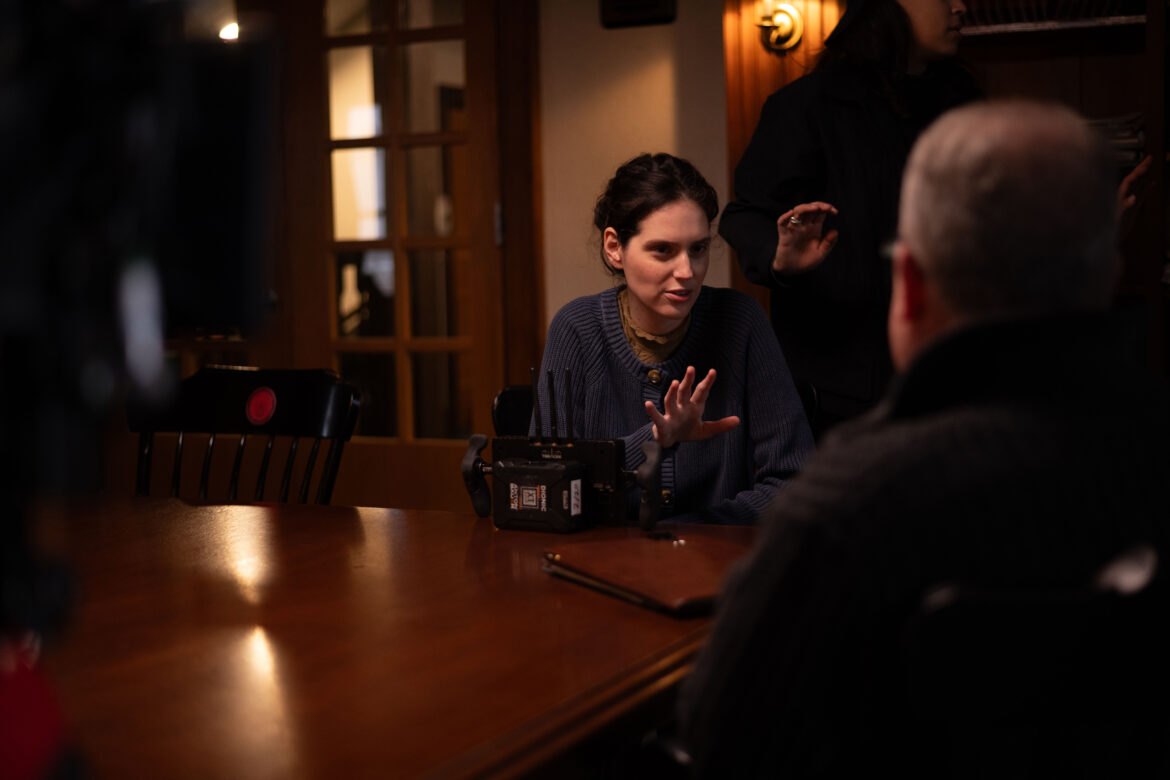By Kirsten Coachman
“I pulled off the heist of the century.”
The said heist, according to director-writer-actor Eva Victor, is the assemblage of a brilliant cast of actors for their feature film directorial debut, which includes BAFTA winner Naomi Ackie (“Blink Twice”) and Academy Award nominee Lucas Hedges (“Manchester By The Sea”).
The trio share the screen in “Sorry, Baby,” directed and written by Victor (who uses they/she pronouns) in their feature directorial debut, and was produced by Barry Jenkins’ PASTEL. At the center of the film are Agnes (Victor) and Lydie (Ackie), two best friends who once shared a house while attending the same New England-based grad school. While Lydie has moved on to the next stage of her life, Agnes is still in the same house now teaching at the same school where she once excelled as she endures the lingering effects of an unimaginable trauma from her time as a student.
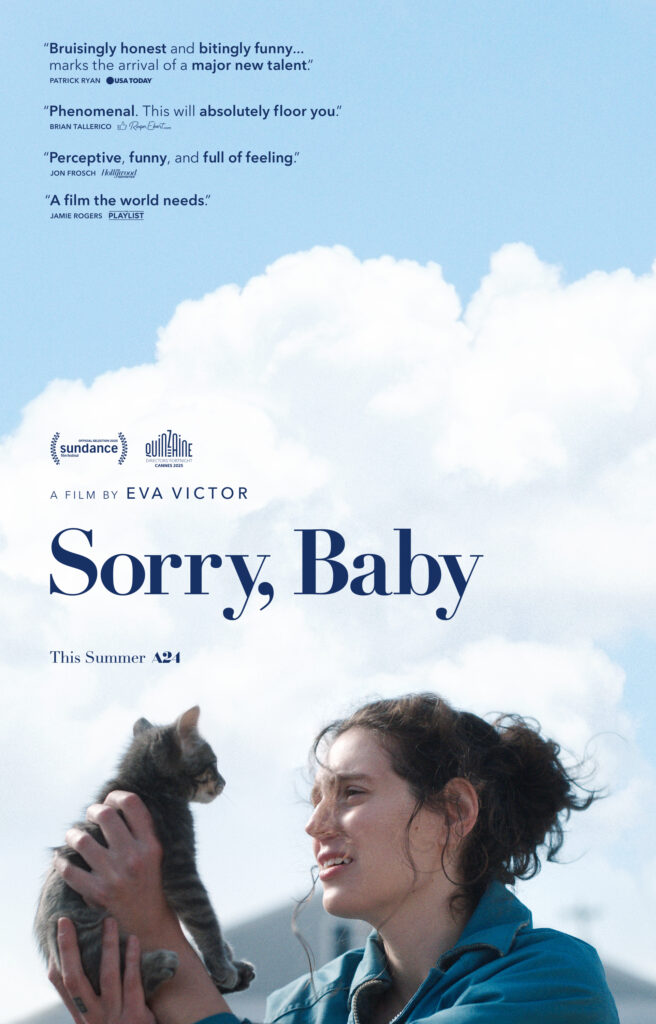
A breakout hit from this year’s Sundance Film Festival, winning the Waldo Salt Screenwriting Award, “Sorry, Baby” is stunning and an extraordinarily moving debut from the first-time director. Told onscreen in a non-linear fashion, the audience sees Agnes through different snapshots of time. While addressing the heavier moments of life, Victor weaves in a comedic touch that allows both Agnes and the audience to come up for air.
Victor has appeared in various film and television projects, most notably in Showtime’s “Billions.” They also have previously written for publications such as the New Yorker and Reductress and created videos for Comedy Central.
Art U News sat down with Victor during the recent San Francisco press stop for “Sorry, Baby.” Victor spoke about building chemistry with co-star Ackie, what they learned from directing their first feature that they want to take into future projects, and advice for Academy students dealing with impostor syndrome.
The film centered on this friendship with Lydie and Agnes, and of course, they both have different experiences that take them on these different pathways. I felt like Agnes’s relationship with Lydie on screen felt so lived in. How did you go about building that chemistry with Naomi Ackie?
I’d seen Naomi in a few things, and everything I’d seen her in up to that point had been pretty serious. At “The End of the F***ing World,” I think it was funny, but in this really stylized way, and when I met her, I was just so overcome with how warm and funny she was. She was so goofy and just like open. And I always said that Agnes is the moon and Lydie is the sun, and we just need to find the sun, and then the film will make sense [laughs]. Then, we read together, and it just felt like immediately, like she just was this whole person, and it just felt so true. Like when she said the line, “I wanna make a really good person,” when we read together. And it was so beautiful how she said it and so thoughtful, and it just was so obvious that we needed her.
Honestly, we didn’t do much prep. It was clear to us both that we didn’t really wanna rehearse. It was more hanging out beforehand. And then the first week of the schedule, we just did the friendship scene. So, that was very fun because we just kind of built these people as we went, and it was so easy. I don’t really know why; we just got along so quickly.
It really felt like the scene where you guys are in the grass, it kind of just felt like you were like, “Put the camera on this and we’ve got this.” It just felt very natural. Just like these are two friends that we’re eavesdropping on.
Thank you.
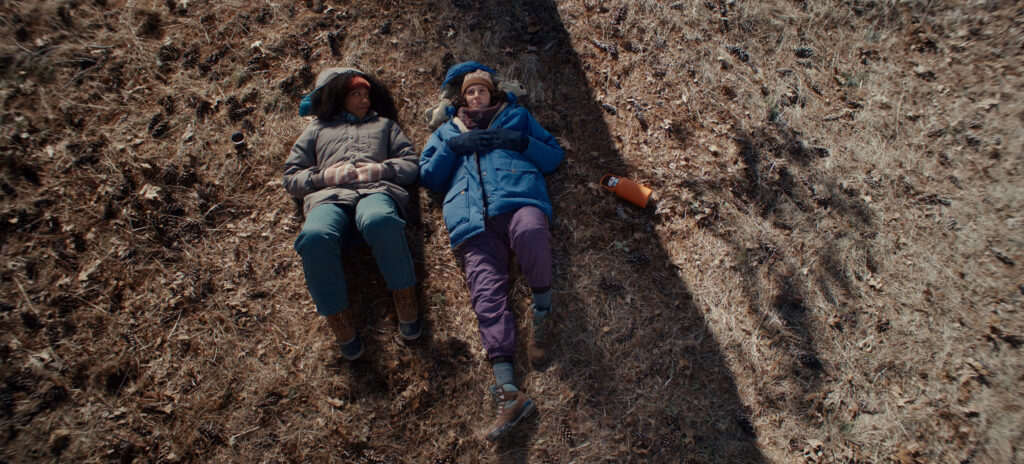
One of the scenes that really stood out to me is when Agnes pulls off to the side of the road while she’s having her anxiety attack, and this man comes and initially tells her the place she’s at is closed but then comes up to the car and I thought, “Oh no! He’s going to scream at her while she’s having this moment,” but then he comes up and it’s this unexpected kindness from a stranger. I was hoping you could talk a little bit about the making of this scene and what made John Carroll Lynch the right person to play opposite—I usually think of the Zodiac killer when I see him onscreen.
Good. I think it’s a great choice that he’s nice in this movie.
I don’t really remember writing that part. [Laughs.] I know I wrote it, don’t worry. I think there’s definitely this amazing thing that gets to happen, which is this character comes in 75% of the way through the film and just like infuses the film with a new energy and a new perspective. I feel like there were a couple moments in the film that I am trying to play with my audience in that way. Like, we get to the jury scene, and then I’m kind of hoping everyone’s like, “Oh, the movie is blowing it because now Agnes is in court and that’s so not the tone of the film.” And then you find out she’s on jury duty, and it’s like, “Right, that’s more the tone.” It’s some playful things of like we’re here, but it’s actually this.
And I think with the John Carroll Lynch thing, and it was like, she’s getting yelled at, but he’s actually gonna breathe with her. And I think those were fun to write ’cause it’s a bit of a turning something on its head thing. I think also the film was mostly young people who were in grad school, and it felt really exciting that Agnes kind of gets this paternal figure for a minute. And I think it’s a big moment for Agnes because there are also all these moments in the film where she doesn’t want to go inside Gavin’s (Hedges) house. She’s been inside this house where she felt trapped, you know, in the kind of pivotal moment of the film. And she just sits outside with this man, and he gives her a sandwich.
And she’s not claustrophobic, which is a feeling that exists in the film for her. And because he is a stranger, she doesn’t have to lie. She kind of just gets to say, “I feel weird and I feel guilty when I don’t think about…” Like, she just kind of gets to rattle off what’s on her mind because the stakes are lower. And I think John Carroll Lynch not being scared by what Agnes is saying—his name is Pete in the film, but literally no one knows that—him not being scared, gives her this ability to process and say things on her own terms. I feel like the whole film kind of exists in that scene. And I’m very lucky he did it. I liked that he was the Zodiac killer and that he gets to be a nice guy in this one. [Laughs.]
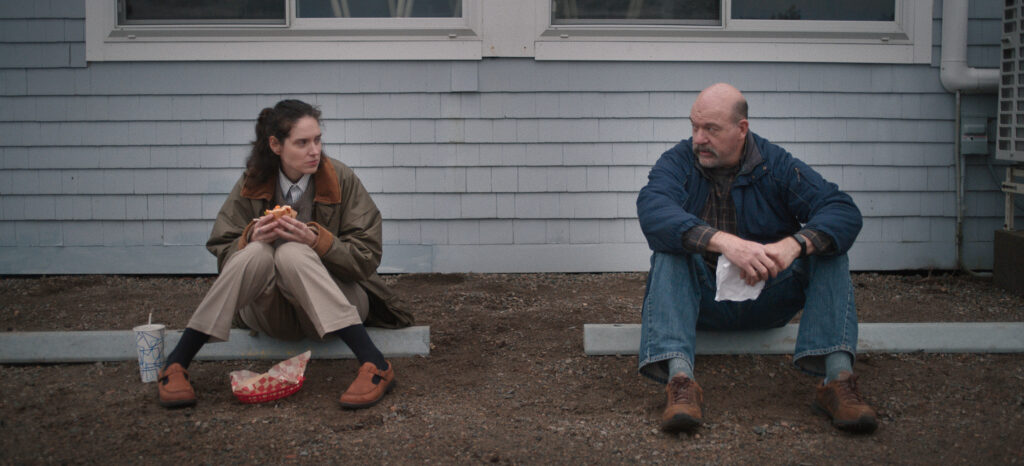
It seemed like the bathroom—slash—the bathtub seemed to play like a safe space type of character because it seemed like the room in the house where different vulnerable moments played out over time. Lydie tells Agnes at the beginning about her big news, and then later, that’s where we see Agnes tell Lydie that something has happened, and then it’s where Agnes and Gavin share an intimate moment. What was it about that space where these intimate and vulnerable moments happen in the film?
Definitely, it’s like this place that I kept thinking about; that scene where Agnes tells Lydie what happened. It’s almost like Agnes is in Lydie’s womb, and they’re in this just safe zone together. And the film is very small in scope, and so most of the locations we see over time, they’re in conversation with each other, and how this person’s experiencing time and space is changing. So I like that we meet them and they’re having this conversation in the bathroom that seems to have no bigger meaning. You know, they’re just in the bathroom brushing their teeth, but they have a huge history in this place. Like this is a place where they share. And then when we go back in time, we’re back in that we have that same sort of shot through the doorway of them in the bathroom experiencing this really profound dark night.
And I also like that when Gavin’s in the bathroom, like this place holds all that for Agnes, but he has no idea. And Agnes and the audience have this secret about what this place means. And he’s not really a part of that.
I love the bathtub. The bathtub is where I do my business, no matter what it is. And it just felt like this person was trying to feel safe and comfortable.
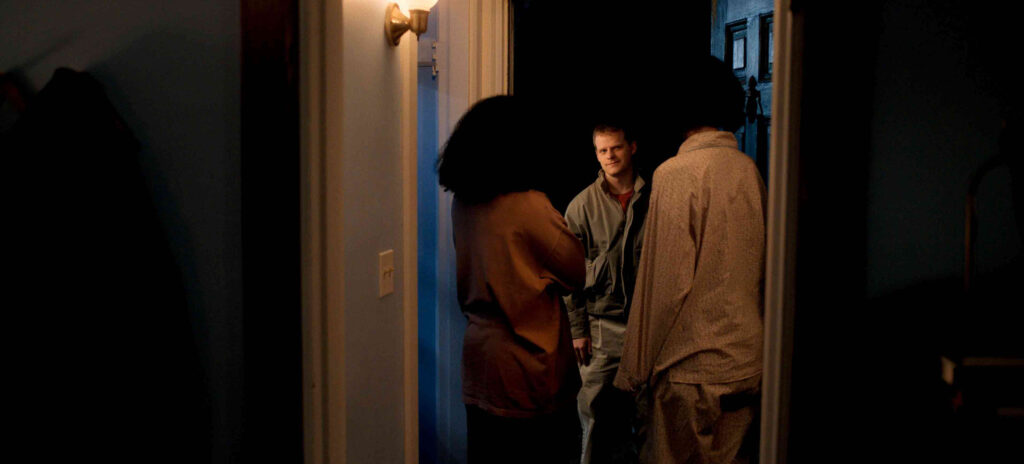
You did a lot in this film, from writing the script to directing to acting. How did you find balancing the three while filming?
Honestly, the writing happens so much earlier that like, that part was done mostly. When we cast Naomi, we went back, and I did like a “Naomi pass” where I wanted to infuse it with her voice a little more. And you know, you write things as locations, like the line where Agnes says, “I’m sorry, the bathtub’s so small.” And [Gavin] says, “This bathtub, no, it’s not small, it’s perfect.” Or something that I added because the bathtub was so small, you know, it was like little things like that. But those are all pretty fun, and it’s not structural. But the directing and acting at the same time, I feel like that was the main question the financiers had for me when they were trying to figure out if they wanted to finance the film, was like, “How are we gonna do that?”
And I was like, “Well, I’m gonna prepare a lot and I don’t know, we’re gonna schedule the first few days a little lighter to figure out what that flow is like, and we’re gonna make sure playback is near set or near where we’re shooting. Yeah, I think it was like a real leap of faith for everyone to let me do it. I mean, I had a huge support system in my DP (Mia Cioffi Henry) and in the two producers who were on set and in Naomi, who was my main scene partner in the film, who was very, very cool with me leaving all the time to go watch. You also have stand-ins like, there’s, there’s all these tools, but people were very game, which made it a lot easier.
Was there something as a first-time director that you learned while making the film that you wanna apply to your next project?
You know, I think there is really something when you’re hiring people to work on your film; it doesn’t really matter someone’s experience level. It’s more looking for someone to have that fire in their eyes about the script. Like the dream is that people who work on the film are people who read it and feel like it’s now theirs. And so following sort of that gut instinct of like, “Oh, you’re the person for this,” I think I did that, but also, I think it was confirmed for me it needs to become someone’s passion project too, hopefully. I mean, I also understand you know, you clock in and clock out a lot, that’s okay too. But finding those people who are down to take this journey with you for years and years, it’s a very intimate thing. So, continuing to look for people who have that kind of fire about the project itself and not about you. You want someone who feels like the script is what they’re wanting to turn into something. That’s where the real work comes in. It’s like you’re all working on the script.
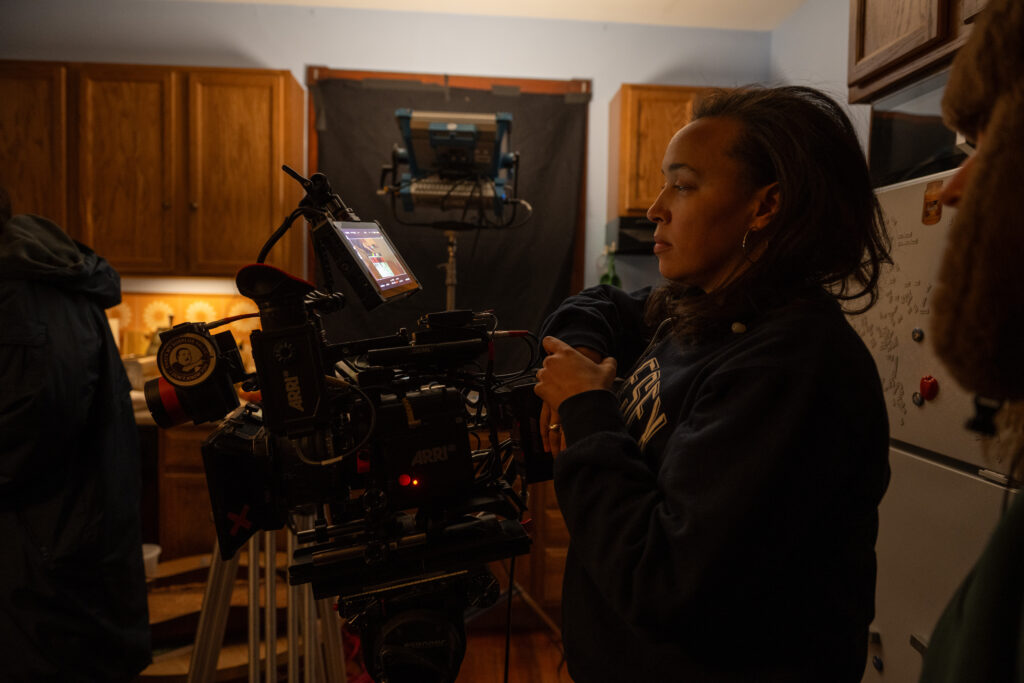
You’ve previously spoken about how Barry Jenkins was pivotal in seeing yourself as being able to direct this film. Can you talk a little bit about the importance of having that kind of encouragement in your corner? And was there maybe a key piece of advice that got you to that place of being like, “Yeah, I can do this”?
Before I sent [PASTEL] the script, [he] was like, the videos we were making online are filmmaking. And I think that planted a seed. And I kind of came to wanting to direct it on my own, but definitely because he had said that to me, I felt like someone was in my corner and would be there. The best thing he continued to remind me was, “I’m gonna give you notes, other people are gonna give you notes, but at the end of the day, you have to make the film that you wanna make and only you know how to do that.” And in some ways, it was like, just tell me what to do. But then, in other ways, of course, it’s such a gift to give me that kind of trust of not trying to hold on to what I’m doing, to let me figure out what I’m doing along the way.
That kind of support and trust for a first-time filmmaker is kind of unheard of and so, so special. I think that’s the reason “Aftersun” is such a beautiful film. I think it’s the reason “All Dirt Road Tastes of Salt” is a beautiful film. PASTEL was supporting them in making the film as undiluted as possible and as much of the film that they wanted it to be as possible. And I felt like I got that same trust and patience. And I have to say, Naomi was a huge part of that too, because day one, she was like, “We’ll do whatever you want. Take your time. I’m here.” And I think she gave me that same gift that Barry gave me and that my producers gave me of you know, and it’s okay for you to figure it out.
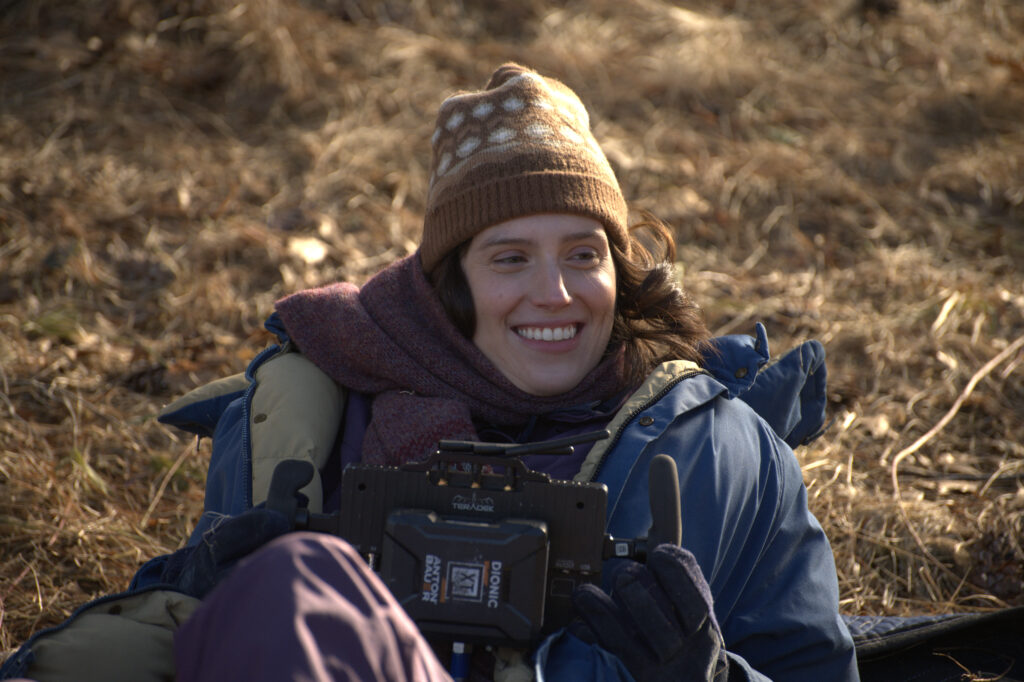
At Academy of Art, we offer different tracks in the world of filmmaking, from acting to writing and directing. In thinking of impostor syndrome, what’s something that you’d maybe advise students if they start feeling like that in their studies and just everyday occurrences?
I don’t know how to get over that. Just work really hard anyway.
I think you can prepare. I don’t think someone has to give you permission to do something to do it. You can prepare your film. I think work has always been the solution to my impostor syndrome, and kind of accepting that it might never go away. So that’s not the indicator that you shouldn’t do something.
I think the alternative is also kind of scary. Like, people who don’t have that, I’m like, well, then you’re demented. But it’s also just part of making something. It’s really scary to put yourself out there as an artist. It’s [a] huge leap, and you’re kind of just screaming out like, “Is anyone out there? ‘Cause I feel alone and in this way; do you feel alone in this way too?” And, I guess, the job is to feel all those things but still do it.
But I don’t know. I’m working on it still.
“Sorry, Baby” is now playing in theaters. This Q&A has been edited for length and clarity.
